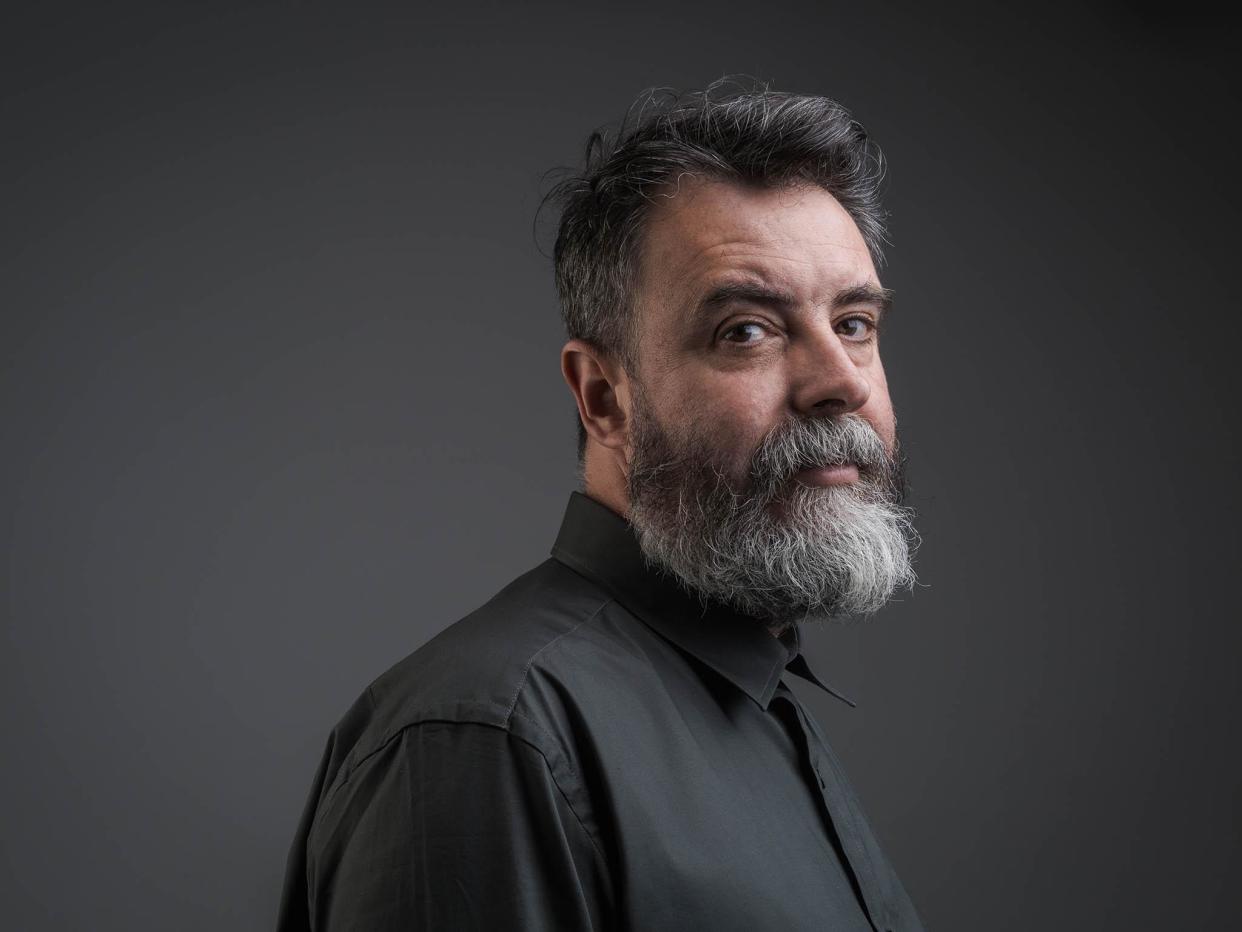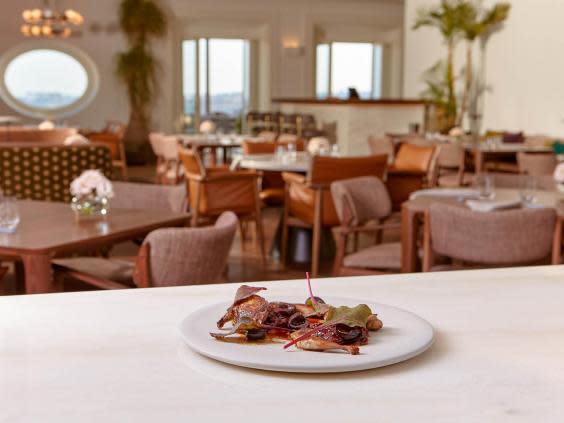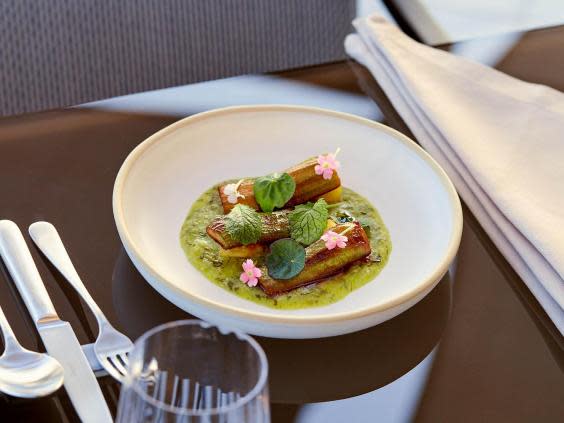Chef Nuno Mendes on career regrets, the validity of Michelin stars, and east London restaurants

Walking around his new kitchen at the top of the Bairro Alto hotel in Lisbon, Nuno Mendes looks more like an old sea captain than a chef.
He prowls his bridge, checking everything is just so, smoking some goose barnacles here, slicing a pork loin there.
His thick beard and arm tattoos don’t mitigate the impression, and nor does the wide Tagus river, visible in all its glory from the terrace.
Mendes is friendly and thoughtful and good company, which is not always the description that springs to mind with Michelin-starred chefs.
This is the 47-year-old’s first restaurant in Lisbon, where he grew up, after a career that has taken him around the world, to California and Japan and Spain and, for the past decade, London. There’s a lot on the line.
The refurbished Barrio Alto, right in the centre of the old city, is a multimillion-euro project that has been years in the making. Mendes has had a hand in every aspect of the food and drink, down to the green matcha KitKats and instant noodles in the minibars, and the runnier-than-usual pasteis de nata in the ground-floor bakery, which remind him of the custard tarts he used to eat with a spoon when he was a boy.
“We’ve had a lot of Portuguese people come here and say it tastes Portuguese, which makes me really happy,” he says. “I wanted to keep the punchy flavours, while reducing the salt and sugar a little bit. Traditionally the Portuguese disguised some of the product with salt, and sugar was a sign of wealth. Now the product is better, we don’t have to do it so much.”
A long time ago you could do something on your own and wing it. Now you need a million pounds to get off the ground
Nuno Mendes
The food is an exhibition of Portuguese ingredients: ribbons of sweet, juicy squid from the deep waters off the Azores; oysters from the Algarve, gently cured red mullet. “I’m really excited about the journey we have ahead of us. It should be fun.”
Although he will be here at least once a month, checking everything is up to scratch, most of Mendes’s life remains in east London, where he lives.
He has just won a Michelin star for Maos, his experimental 16-seat restaurant at Shoreditch’s Blue Mountain School. As usual, there has been plenty of debate about the ongoing value of the guide, but Mendes is in no doubt that it still has power.

“London’s going through a tough time, so things like that are helpful,” he says. “Maos is a labour of love, and it’s never going to make much money, so it’s nice to see it getting to a point where it’s sustainable. There’s rents, business rates, staffing and people not being sure what will happen next [with Brexit].
“A long time ago you could do something on your own and wing it, and open in a rough neighbourhood and make it sustainable. Now you need a million pounds to get off the ground, which means investors. All of a sudden there are a lot of financial pressures and you compromise on what you want to do.”
Sometimes I feel like life has passed me by. I’ve lived my life through the kitchen, and once you step outside you realise you’ve given so much to the work
Nuno Mendes
He’s speaking from experience. His first restaurant in London, Viajante, opened in 2010 and won him his first Michelin star before it closed in 2014. Next came the Chiltern Firehouse, in Marylebone, which became London’s new celebrity haunt, heaving with the great and good, scoffing crab donuts, which has somehow retained its buzz. “I love it there,” he says. “It’s always a party. It has a reputation as a place where you can get wild, but it’s not forced.”
Then came Taberna do Mercado, in Spitalfields, an all-day Portuguese place. Great reviews weren’t enough to make the numbers work, and it closed last year.
“That was a big blow,” he says. “We just couldn’t afford it. I didn’t want to get to the point where you start cutting and cheating our guests. But there’s unfinished business there, and I’d love to do it again, maybe as a neighbourhood restaurant.” His London favourites are mainly east London locals: Brawn, Brat, Smoking Goat, Perilla, Primeur.
He started his career in some intensely perfectionist kitchens, working for Ferran Adria, Jean-Georges Vongerichten and Wolfgang Puck, among others, and made his name as a chef’s chef. Gordon Ramsay praised his “fingertip control”. Now, nearly 50, he sees the downsides of his line of work more clearly.

“I still have lots of things I want to do, but I want to do fewer things and do them better,” he says. “Sometimes I feel like life has passed me by. I’ve lived my life through the kitchen, and once you step outside you realise you’ve given so much to the work. A lot of my friends are going through the same thing. It’s not just the food, it’s hospitality more broadly. You can struggle to speak to people. You’re a zombie. I wish I was a better person, and a better parent, so I’m trying to catch up on spending time with my kids.”
Not all of his peers are as reflective. In an interview in August, Marco Pierre White said women were too emotional to work in kitchens, and not strong enough to carry heavy pans. A couple of months later Heston Blumenthal said women struggled to reach the top of their profession because of their biological clocks.
“You know, I guess some of these guys feel that they’re bulletproof because they’ve been around for so long. But it’s not true. By now they should know that you just don’t go there. Why are you putting yourself in harm’s way by saying something so silly? If you’re going to say something really f***** up, just don’t say it. Silence is a beautiful thing.”
With that, he excuses himself to return to the kitchen, where his team have been carrying on the quiet, efficient ballet of a happy brigade.
At the pass, he starts curving quenelles of herb paste onto plates. It’s only in Portugal that I have been taught how to pronounce his surname correctly: not men-dez, as it’s written down in English, but something closer to mensch. It seems appropriate for this charming master of Portuguese cuisine.
TAP Air Portugal flies direct from London Heathrow, Gatwick and Manchester to Lisbon and Porto, prices start at £89 return including all taxes and surcharges. www.flytap.com; 0345 601 0932
Read more
Jamie’s restaurant empire plots international launch after UK collapse
Black Axe Mangal: The restaurant where heavy metal meets kebabs
Eggslut restaurant review: As uninspiring as the name suggests
Restaurant launches ‘split bill’ policy to combat awkwardness


